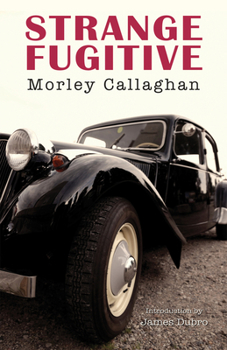Strange Fugitive
Select Format
Select Condition 
Book Overview
North America's first gangster novel--originally published in 1928--this page-turning thriller features characters both charming and terrifying. Set in Toronto during the era of speakeasies and underworld vendettas, the tale centers on Harry Trotter, an amoral figure who loses his job and his wife in quick succession. He soon evolves from a bootlegger into a reputable gangster, doing as he pleases and strong-arming anyone who stands in his way. Reviving the narrative that set the literary stage for the hard-boiled crime genre, this is a seething noir tale of crime, murder, betrayal, and knuckle-bruising politics.
Format:Paperback
Language:English
ISBN:1550961551
ISBN13:9781550961553
Release Date:December 2011
Publisher:Exile Editions
Length:258 Pages
Weight:0.73 lbs.
Dimensions:0.7" x 5.4" x 8.4"
Customer Reviews
2 ratings
The lost (and now found) seminal crime novel masterpiece
Published by Thriftbooks.com User , 20 years ago
This is a new edition of a novel I've always considered an early classic of the hard-boiled crime genre - written by an author who became better known for (a) being Hemingway's friend and (b) his later intense works of conscience, of social and religious morality.Now I've got some support for that view by the new introduction in this edition by James Dubro. Dubro's has uncovered the real-life gang warfare that was taking place in Toronto and being reported by the Toronto Star where Morley Callaghan worked - and which obviously influenced him. Dubro argues that Callaghan's first novel may have been the first-ever in the genre of the gangster novel.Strange Fugitive is Callaghan's first and, judging by it at the time, you might think he would become another James M. Cain.Far different from Callaghan's usual earnest and tortured central characters, Harry Trotter is a rough, amoral figure who loses his job and his virtuous wife Vera on whom he regularly cheated. He drifts into bootlegging, becoming a leading gangster in 1920s prohibitionist Toronto.Trotter is an uncomplicated strongman, who seizes what he wants, sleeps with whomever he feels like, wipes out competitors and never worries about whom he hurts. However Trotter keeps thinking about getting back with Vera. This and hints about his childhood relationship with his long-dead parents lead one to realize he is disturbed, though he is not introspective enough to realize this himself. The point of view is always that of the unperceptive Trotter. As a result, the important themes of the story are revealed between the lines, by the reader connecting random thoughts. It's all bubbling beneath the factual surface.This is also one of Callaghan's most sparsely written stories. The narrative is delivered matter-of-factly, without a lot of adjective and adverbs, and with long scenes of sharp dialogue without attribution - again much like the hard-edged crime fiction just being developed then.The dispassionate tone of the reporting, the author's voice never supplanting his subject's and with only a faint hint of irony, makes this the closest Callaghan comes to adopting the style being propagated at the time by his modernist colleagues like Joyce and Hemingway.Compared to his later work, Callaghan in Strange Fugitive is depicting an earlier world, a more primitive character, and it's thrilling for the perceptive reader.
DOGS
Published by Thriftbooks.com User , 24 years ago
-I LIKE DOGS!- p.s. I am 15p.p.s. Where the hell is my "Cats" Review.





